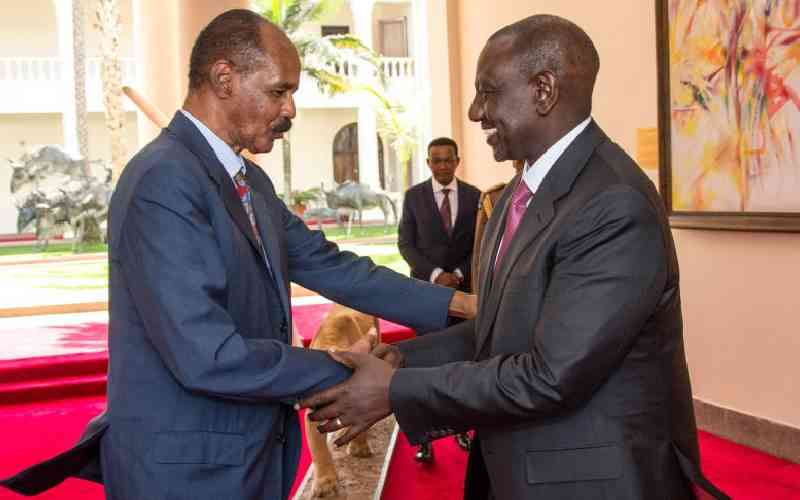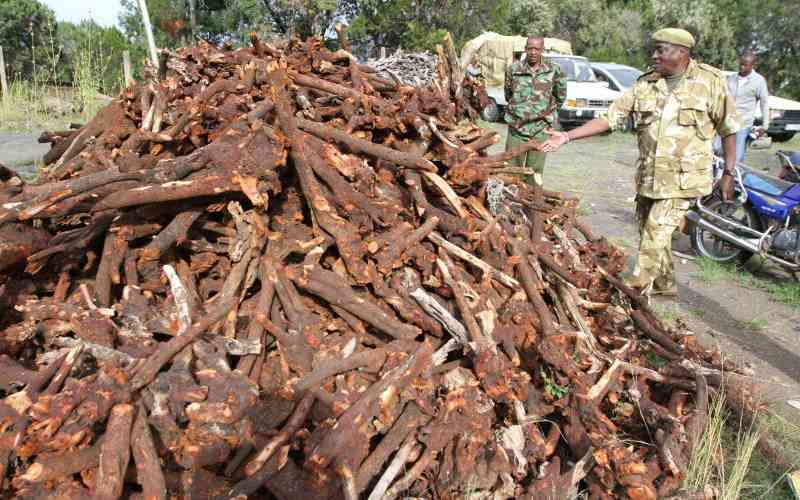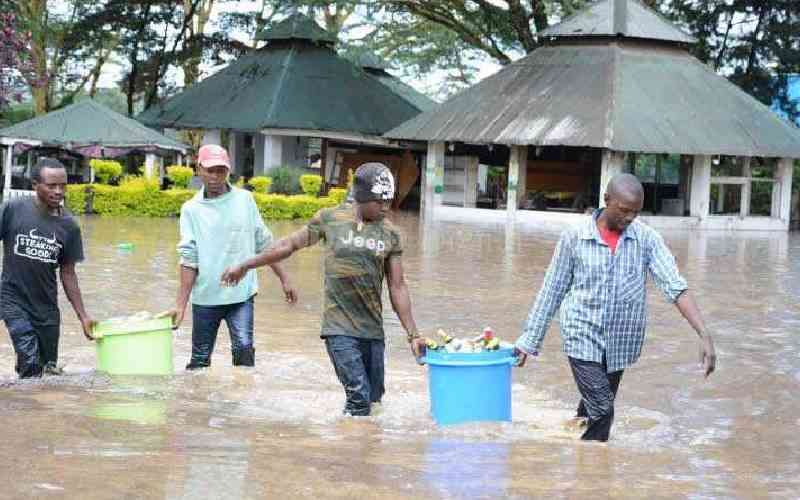What started as a social media outburst after Jomo Kenyatta University of Agriculture and Technology awarded 118 PhDs last month has triggered a furious debate, with the new graduates sharing their frustrations over being labelled “fake” after years of toiling.
Dr Josephine Miyonga was bubbly when she stepped into Holy Ghost Cathedral in Mombasa last Saturday. Clad in the blue gown she wore during her graduation at Jomo Kenyatta University of Agriculture and Technology (JKuat) last month, Dr Miyonga stood out from her friends and relatives who had come to celebrate her achievement. The attire was complete with a red and blue hood and a cap.
There were friends she went to school with at the Kenya Teachers Training College in 1984 and those she graduated with from Coast National Polytechnic. The latter institution has since become the Technical University of Mombasa. Also invited were friends she met while she pursued her Master’s degree at JKuat, before she enrolled for a PhD at the same university in 2012.
It had been a long eight years of waiting to get a PhD and Dr Miyonga, a lecturer at Pwani University, wanted to crown it with a thanks-giving mass at her local church.
The church service was all she had planned for from the day she received a call from JKuat informing her that she had made it to the list of some 118 students who were to graduate with PhDs from the university.
“Getting my PhD was a long and torturous journey. I wouldn’t have made it were it not for the strength I got from God. That’s why the first thing I did after I graduated was to attend a thanks-giving mass at my local church,” says Dr Miyonga.
But as she revelled in her glory in the company of friends and church members, a fiery debate concerning JKuat’s 118 degree raged on social media.
Makau Mutua, a Kenyan-American professor of law, sparked a fiery exchange with a tweet that questioned the credibility of the PhDs. “How credible are the 118 PhDs awarded by JKuat? Either they are fake or academic standards there are near zero. Let’s end this academic fraud,” tweeted Prof Mutua.
He argued that the PhDs were likely to erode credibility of Kenya’s education system. “The damage done by JKuat’s 118 likely phony PhDs is incalculable. Kenyans applying for post-graduate programmes abroad will face heavy skepticism. This brings into disrepute Kenya’s entire educational system and wipes out its credibility. It’s a terrible burden on the youth,” he wrote.
A Mr Paul Dalizu faulted the professor in a tweet, saying: “Are you afraid of us having more PhDs? The days of archaic frustrations by professors and doing PhD for 10 years are over. The bottle necks are now removed,” said Dalizu.
Closer home, Dr Miyonga had woken up to a WhatsApp message in which a member of a group she belonged to dismissed her qualification as fake.
“At first, I was unbothered by media reports that I had acquired a fake PhD.... But I was very bitter when a member of a WhatsApp group I belong to raised the issue to other group members. It felt bad since I had invited the group members to a party I was organising,” says Dr Miyonga.
Dr Miyonga, who specialised in business administration at the JKuat School of Business, says she deserves the PhD.
“I have come a long way in my schooling, being a product of Form Six. All I have done in my life is work hard for every achievement in order to set an example of hard work and resilience in education. It is unfair that people who don’t understand my struggles are dismissing my qualification as fake,” she says.
Stay informed. Subscribe to our newsletter
Dr Miyonga has been a lecturer at Pwani University since 2016 after more than 20 years of lecturing in other institutions of higher learning.
She says her PhD studies involved rigorous seminar presentations, corrections, fieldwork and a lot of back-and-forth engagements with her two supervisors.
Dr Miyonga analysed how strategic management practices impact commercial banks in Kenya. She says her research was to address challenges that commercial banks are grappling with at a time most of them are either edged out of business or forced to merge.
She was supervised by Prof Gregory Namusonge, Dean of the School of Entrepreneurship, Procurement and Management at JKuat and Prof Maurice Sakwa, also a don at JKuat.
The two are currently being investigated by the Commission for University Education (CUE) for allegedly supervising a large number of PhD students.
Prof Namusonge is said to have supervised 16 doctorate students while Prof Sakwa allegedly supervised 10 PhD students against the CUE requirement of three students.
To some, the decision to probe the alleged fake PhDs is untimely. Questions arose as to why the commission waited until the students graduated to start their investigations instead of ensuring that the right numbers enrolled for the programme from the start.
But CUE chairman Prof Chacha Nyaigoti Chacha says it isn’t the commission’s work to micromanage universities.
“CUE sets standards and guidelines for all academic and university programmes, including PhDs. All universities are expected to adhere to these standards, guidelines and processes. CUE does not micromanage the teaching, learning and research undertakings by universities on a day-to-day basis,” says Prof Nyaigoti.
He says it is the work of individual lecturers, departments, faculties, senate and council, as legal organs of a university, to safeguard standards and academic quality of their programmes.
“We, however, conduct periodic inspections to verify compliance,” he says.
Prof Robert Kinyua, JKuat acting deputy vice-chancellor in charge of academic affairs, maintains that the university observed stringent measures in mounting its academic and research programmes.
“All degrees of the university are meritoriously earned and no student is allowed to graduate without going through the due process regarding coursework, seminars, original research, external examination and publication,” says Prof Kinyua.
He says the university had many qualified academic staff to supervise the doctoral students.
Dynamic faculty
“JKuat has a highly qualified and dynamic faculty comprising 923 academics. The College of Human Resource and Development, for instance, is served by 85 doctorate degree holders,” says Prof Kinyua. Some 89 of the PhDs that were awarded at the university came from the university’s College of Human Resource and Development. Prof Kinyua said some of the students who graduated in June had enrolled for their PhDs in 2010.
Dr Peter Munyaka, who also obtained a PhD in the highly disputed graduation, is unbothered by reports that his PhD degree could be fake.
“Most of those talking have no idea what it means to get a PhD. These people don’t know the sacrifice it takes to pursue a PhD and how a student hangs in there with the hope of getting rewarded at the end of it all,” says Dr Munyaka.
The 50-year-old describes his PhD journey as hectic after he enrolled at JKuat in 2011 while he worked at Kenya Institute for Public Policy Research and Analysis.
He recounts the countless presentations he made at seminars and to panels of professors who would sometimes dismiss his arguments and send him back to the drawing board.
Dons that Hashtag spoke to said frustrations facing PhD students are not unique to JKuat.
“PhD students in Kenya go through a lot of challenges before they graduate. It isn’t easy for them, having to chase supervisors around to have their work approved before they move on to the next step,” says Dr Chrispus Wawire, who teaches educational psychology at Kenyatta University.
Dr Wawire, who is supervising PhD and Master’s students, says supervisors at universities have many responsibilities that leave them with little time for their post-graduate students.
“PhD students are always chasing supervisors who are always busy in other engagements. Though I am supposed to accompany my students to the field to ensure they use the right methodologies to collect data, I just don’t have time and resources to do all this work,” says Dr Wawire.
CUE regulations provide for lecturers to spend a maximum of 40 hours per week lecture time in university during which they are supposed to teach, prepare examination papers, do research, mark scripts and supervise academic work among other responsibilities.
They are also required to participate in community engagements.
At the University of Nairobi, a lecturer who declined to be named for fear of being probed by CUE, said he is supervising seven PhD students and 25 Master’s students, which is way above the commission’s requirements.
“This problem isn’t just at JKuat.... I get more than five applications of students interested in PhD and Master’s every year,” he says.
Because of the large number of students, the lecturer says he helps only those students who show initiative in their work while the rest stall for many years before they graduate.
On top of the heavy workload, Dr Wawire says underfunded universities are no longer facilitating supervisors.
Dr Jane Ambuko, a senior lecturer and head of horticulture in Department of Plant Science and Crop Protection at UoN, says Kenyan PhD students fight a lot of setbacks to complete their studies.
“PhD students in Kenyan universities may have their own issues but completing a PhD isn’t a walk in the park. Some grapple with lack of finances and juggle family and work but still make time for their PhD. This isn’t always easy,” says Dr Ambuko.
Dr Ambuko, who went to Tsukuba University in Japan for her doctorate studies, says things are easier for students who study in universities on scholarships abroad as they are assured of finances and have better learning facilities.
But foreign students are also more focused, Dr Ambuko says.
“Students who study on scholarship in universities abroad are usually very hard working because most of them are bound by duration of their scholarships. Some of them also travel on visas that have definite return-home dates,” she says.
 The Standard Group Plc is a
multi-media organization with investments in media platforms spanning newspaper
print operations, television, radio broadcasting, digital and online services. The
Standard Group is recognized as a leading multi-media house in Kenya with a key
influence in matters of national and international interest.
The Standard Group Plc is a
multi-media organization with investments in media platforms spanning newspaper
print operations, television, radio broadcasting, digital and online services. The
Standard Group is recognized as a leading multi-media house in Kenya with a key
influence in matters of national and international interest.
 The Standard Group Plc is a
multi-media organization with investments in media platforms spanning newspaper
print operations, television, radio broadcasting, digital and online services. The
Standard Group is recognized as a leading multi-media house in Kenya with a key
influence in matters of national and international interest.
The Standard Group Plc is a
multi-media organization with investments in media platforms spanning newspaper
print operations, television, radio broadcasting, digital and online services. The
Standard Group is recognized as a leading multi-media house in Kenya with a key
influence in matters of national and international interest.








